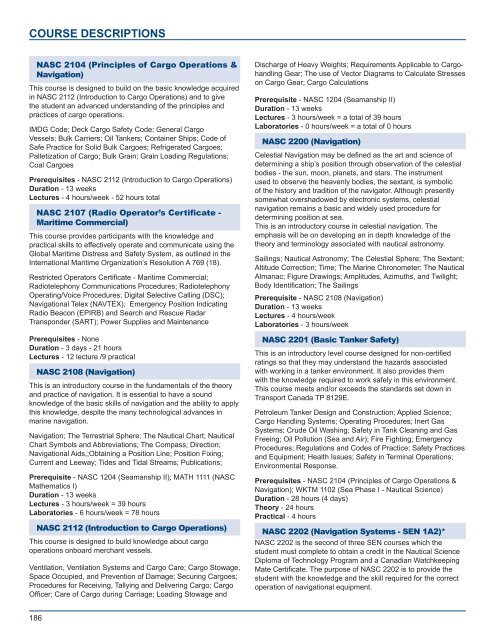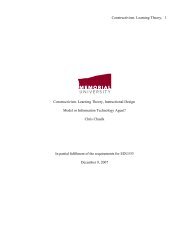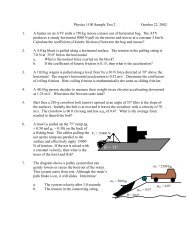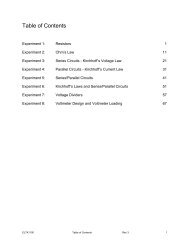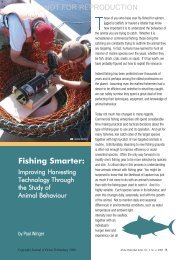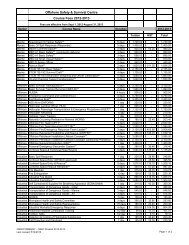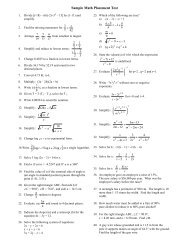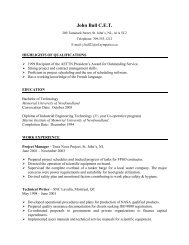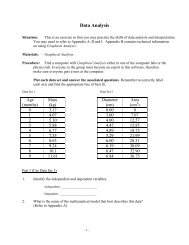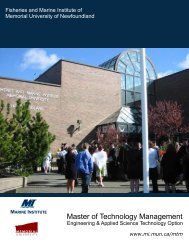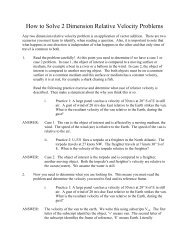Academic Calendar - Fisheries and Marine Institute - Memorial ...
Academic Calendar - Fisheries and Marine Institute - Memorial ...
Academic Calendar - Fisheries and Marine Institute - Memorial ...
Create successful ePaper yourself
Turn your PDF publications into a flip-book with our unique Google optimized e-Paper software.
COURSE DESCRIPTIONS<br />
NASC 2104 (Principles of Cargo Operations &<br />
Navigation)<br />
This course is designed to build on the basic knowledge acquired<br />
in NASC 2112 (Introduction to Cargo Operations) <strong>and</strong> to give<br />
the student an advanced underst<strong>and</strong>ing of the principles <strong>and</strong><br />
practices of cargo operations.<br />
IMDG Code; Deck Cargo Safety Code; General Cargo<br />
Vessels; Bulk Carriers; Oil Tankers; Container Ships; Code of<br />
Safe Practice for Solid Bulk Cargoes; Refrigerated Cargoes;<br />
Palletization of Cargo; Bulk Grain; Grain Loading Regulations;<br />
Coal Cargoes<br />
Prerequisites - NASC 2112 (Introduction to Cargo Operations)<br />
Duration - 13 weeks<br />
Lectures - 4 hours/week - 52 hours total<br />
NASC 2107 (Radio Operator’s Certificate -<br />
Maritime Commercial)<br />
This course provides participants with the knowledge <strong>and</strong><br />
practical skills to effectively operate <strong>and</strong> communicate using the<br />
Global Maritime Distress <strong>and</strong> Safety System, as outlined in the<br />
International Maritime Organization’s Resolution A 769 (18).<br />
Restricted Operators Certificate - Maritime Commercial;<br />
Radiotelephony Communications Procedures; Radiotelephony<br />
Operating/Voice Procedures; Digital Selective Calling (DSC);<br />
Navigational Telex (NAVTEX); Emergency Position Indicating<br />
Radio Beacon (EPIRB) <strong>and</strong> Search <strong>and</strong> Rescue Radar<br />
Transponder (SART); Power Supplies <strong>and</strong> Maintenance<br />
Prerequisites - None<br />
Duration - 3 days - 21 hours<br />
Lectures - 12 lecture /9 practical<br />
NASC 2108 (Navigation)<br />
This is an introductory course in the fundamentals of the theory<br />
<strong>and</strong> practice of navigation. It is essential to have a sound<br />
knowledge of the basic skills of navigation <strong>and</strong> the ability to apply<br />
this knowledge, despite the many technological advances in<br />
marine navigation.<br />
Navigation; The Terrestrial Sphere; The Nautical Chart; Nautical<br />
Chart Symbols <strong>and</strong> Abbreviations; The Compass; Direction;<br />
Navigational Aids,;Obtaining a Position Line; Position Fixing;<br />
Current <strong>and</strong> Leeway; Tides <strong>and</strong> Tidal Streams; Publications;<br />
Prerequisite - NASC 1204 (Seamanship II); MATH 1111 (NASC<br />
Mathematics I)<br />
Duration - 13 weeks<br />
Lectures - 3 hours/week = 39 hours<br />
Laboratories - 6 hours/week = 78 hours<br />
NASC 2112 (Introduction to Cargo Operations)<br />
This course is designed to build knowledge about cargo<br />
operations onboard merchant vessels.<br />
Ventilation, Ventilation Systems <strong>and</strong> Cargo Care; Cargo Stowage,<br />
Space Occupied, <strong>and</strong> Prevention of Damage; Securing Cargoes;<br />
Procedures for Receiving, Tallying <strong>and</strong> Delivering Cargo; Cargo<br />
Officer; Care of Cargo during Carriage; Loading Stowage <strong>and</strong><br />
Discharge of Heavy Weights; Requirements Applicable to Cargoh<strong>and</strong>ling<br />
Gear; The use of Vector Diagrams to Calculate Stresses<br />
on Cargo Gear; Cargo Calculations<br />
Prerequisite - NASC 1204 (Seamanship II)<br />
Duration - 13 weeks<br />
Lectures - 3 hours/week = a total of 39 hours<br />
Laboratories - 0 hours/week = a total of 0 hours<br />
NASC 2200 (Navigation)<br />
Celestial Navigation may be defined as the art <strong>and</strong> science of<br />
determining a ship’s position through observation of the celestial<br />
bodies - the sun, moon, planets, <strong>and</strong> stars. The instrument<br />
used to observe the heavenly bodies, the sextant, is symbolic<br />
of the history <strong>and</strong> tradition of the navigator. Although presently<br />
somewhat overshadowed by electronic systems, celestial<br />
navigation remains a basic <strong>and</strong> widely used procedure for<br />
determining position at sea.<br />
This is an introductory course in celestial navigation. The<br />
emphasis will be on developing an in depth knowledge of the<br />
theory <strong>and</strong> terminology associated with nautical astronomy.<br />
Sailings; Nautical Astronomy; The Celestial Sphere; The Sextant;<br />
Altitude Correction; Time; The <strong>Marine</strong> Chronometer; The Nautical<br />
Almanac; Figure Drawings; Amplitudes, Azimuths, <strong>and</strong> Twilight;<br />
Body Identification; The Sailings<br />
Prerequisite - NASC 2108 (Navigation)<br />
Duration - 13 weeks<br />
Lectures - 4 hours/week<br />
Laboratories - 3 hours/week<br />
NASC 2201 (Basic Tanker Safety)<br />
This is an introductory level course designed for non-certified<br />
ratings so that they may underst<strong>and</strong> the hazards associated<br />
with working in a tanker environment. It also provides them<br />
with the knowledge required to work safely in this environment.<br />
This course meets <strong>and</strong>/or exceeds the st<strong>and</strong>ards set down in<br />
Transport Canada TP 8129E.<br />
Petroleum Tanker Design <strong>and</strong> Construction; Applied Science;<br />
Cargo H<strong>and</strong>ling Systems; Operating Procedures; Inert Gas<br />
Systems; Crude Oil Washing; Safety in Tank Cleaning <strong>and</strong> Gas<br />
Freeing; Oil Pollution (Sea <strong>and</strong> Air); Fire Fighting; Emergency<br />
Procedures; Regulations <strong>and</strong> Codes of Practice; Safety Practices<br />
<strong>and</strong> Equipment; Health Issues; Safety in Terminal Operations;<br />
Environmental Response.<br />
Prerequisites - NASC 2104 (Principles of Cargo Operations &<br />
Navigation); WKTM 1102 (Sea Phase I - Nautical Science)<br />
Duration - 28 hours (4 days)<br />
Theory - 24 hours<br />
Practical - 4 hours<br />
NASC 2202 (Navigation Systems - SEN 1A2)*<br />
NASC 2202 is the second of three SEN courses which the<br />
student must complete to obtain a credit in the Nautical Science<br />
Diploma of Technology Program <strong>and</strong> a Canadian Watchkeeping<br />
Mate Certificate. The purpose of NASC 2202 is to provide the<br />
student with the knowledge <strong>and</strong> the skill required for the correct<br />
operation of navigational equipment.<br />
186


